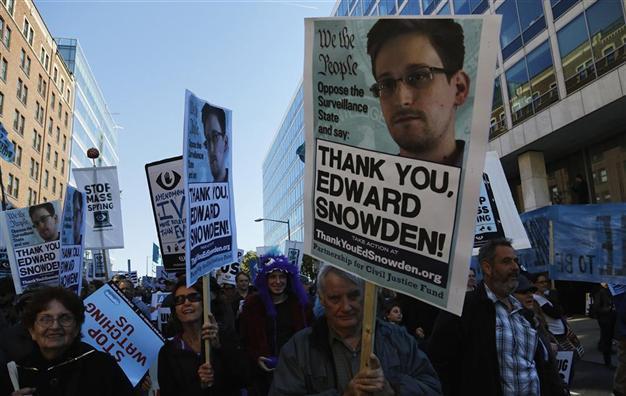Tech giants call on US to reform surveillance laws
WASHINGTON

Demonstrators hold signs supporting fugitive former NSA contractor Edward Snowden as they march at the "Stop Watching Us: A Rally Against Mass Surveillance" near the U.S. Capitol in Washington, Oct 26, 2013. REUTERS/Jonathan Ernst
The world’s leading technological firms have joined forces in a recently published open letter to President Barack Obama that called for the United States government to reform its surveillance policies following the repeated scandals that broke out over the past months.Apple, Google, Microsoft, Facebook, Yahoo, LinkedIn, Twitter and AOL took to a website called reformgovernmentsurveillance.com to voice their protest against the ongoing surveillance controversy that has pitted the U.S. not only against its allies, but also against its own citizens. Since June, newspapers across the world have revealed the wide scope of government spying by publishing classified documents leaked by Edward Snowden, a former U.S. National Security Agency (NSA) analyst now on the run in Russia.
“We understand that governments have a duty to protect their citizens. But this summer’s revelations highlighted the urgent need to reform government surveillance practices worldwide,” the letter said.
“The balance in many countries has tipped too far in favor of the state and away from the rights of the individual--rights that are enshrined in our Constitution. This undermines the freedoms we all cherish. It’s time for change,” the open letter read, adding that the companies were now even more focused on keeping users’ data secure, even if it meant pushing back government requests until they were proven to be “legal and reasonable in scope.”
“We urge the U.S. to take the lead and make reforms that ensure that government surveillance efforts are clearly restricted by law, proportionate to the risks, transparent and subject to independent oversight,” the letter said.
The tech giants outlined a set of new principles which would now govern the sharing of data, including calling on governments to “limit surveillance to specific, known users for lawful purposes” instead of hoarding bulks of private information. In line with these principles, they asked the governments to balance the need for information with users’ privacy interests. They demanded to be allowed to release details about how often surveillance requests were made. The companies also called for all international governments to come together to set global standards regulating surveillance.
The open letter was accompanied by a series of comments from the high-ranking representatives of the companies, with names like Facebook’s Mark Zuckerberg and Yahoo’s Marissa Mayer putting in their thoughts.
“Reports about government surveillance have shown there is a real need for greater disclosure and new limits on how governments collect information. The U.S. government should take this opportunity to lead this reform effort and make things right,” Zuckerberg said. Mayer underlined the loss of trust of the users following the recent revelations, saying, “Recent revelations about government surveillance activities have shaken the trust of our users, and it is time for the United States government to act to restore the confidence of citizens around the world.”
Microsoft’s Executive Vice President of Legal and Corporate Affairs Brad Smith added that users would not be willing the use technology they didn’t trust. “Governments have put this trust at risk, and governments need to help restore it,” Smith said. Twitter CEO Dick Costolo said government surveillance limited the “free flow of information” and “restricts” the voice of users.
“The principles we advance today would reform the current system to appropriately balance the needs of security and privacy while safeguarding the essential human right of free expression,” Costolo said.
The letter and statements constitute the most serious and wide-ranging response to the recent surveillance scandals, which have been putting tech giants like Google and Yahoo in an unfavorable spotlight. Some documents have shown that NSA had, at times, tapped into the data storages of private companies without informing the companies themselves.
Google, Twitter, Yahoo and Microsoft said they had even increased the security of their products following the surveillance reports.
















